In Taiwan, as in many other countries, larger enterprises are required by law to publish annual Corporate Social Responsibility (CSR) reports which detail their impact on society and the environment. Cynics often dismiss CSR programs as greenwashing, virtue signaling, or PR stunts, and a growing number of businesses are embracing the B Corporation movement in order to win third-party recognition for their efforts to do the right thing.
More than 4,300 businesses in 77 countries have obtained B Corp (the B stands for “benefit”) status since the movement launched in Philadelphia in 2006. These enterprises operate in 153 different industries and, according to bcorporation.net, “meet the highest standards of verified social and environmental performance, public transparency, and legal accountability to balance profit and purpose… driving a global movement of people using business as a force for good.”
Taiwan-based companies interested in becoming B Corp certified are usually guided through the process by B Lab Taiwan, a nonprofit established in early 2016 as an authorized partner of B Lab Global and the movement’s first base in Asia.
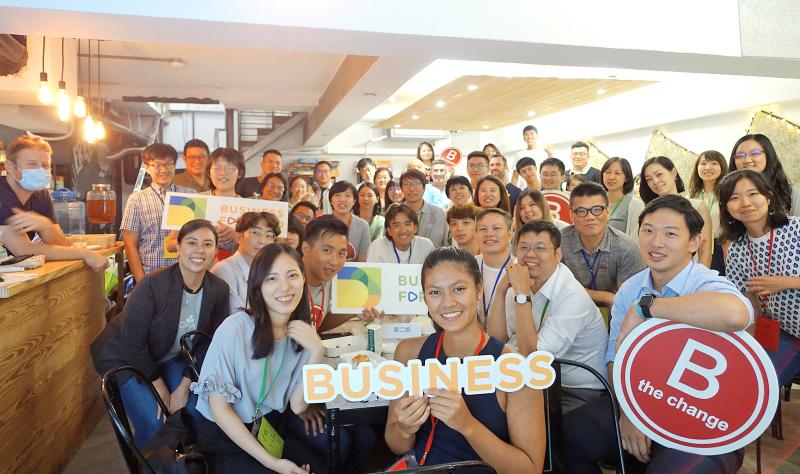
Photo courtesy of B Lab Taiwan
B Lab Taiwan’s Web site (blab.tw) explains that the difference between a B Corp and a social enterprise is that the latter aren’t set up to generate profits, but to address social or environmental issues. B Corps may not have specific goals of this kind, “yet they hope to build a more inclusive and sustainable economic environment [and] use their own business models to have a positive impact on the social environment.”
‘ESG GOALS’
According to an emailed response from B Lab Taiwan, there hasn’t yet been a thorough study to ascertain what proportion of local businesses might be interested in pursuing B Corp status. However, B Lab Taiwan says, the majority of the enterprises it has communicated with show an openness to the idea of getting themselves measured so they can make progress toward ESG (environmental, social and governance) goals.
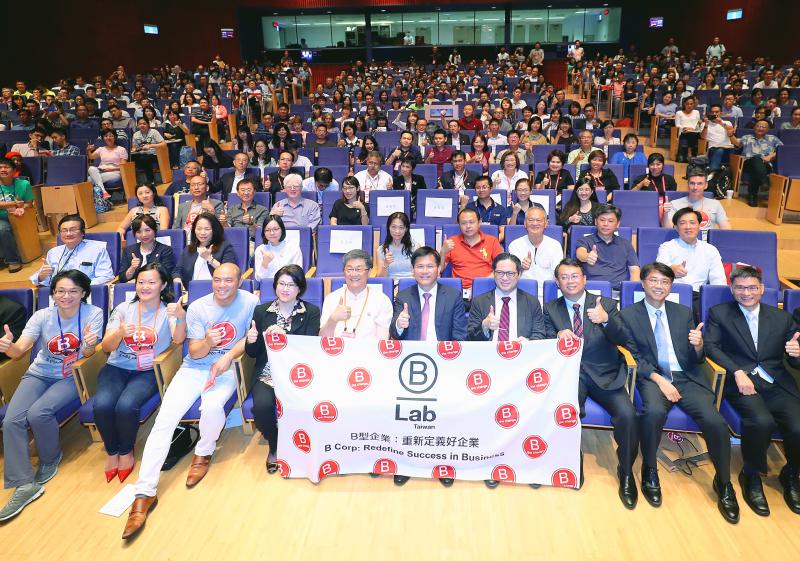
Photo: Chang Ching-ya, Taipei Times
Taiwan’s B Corps are a mix of newer enterprises that embraced ESG principles from the get-go, and companies which have been around for a long time, but are now endeavoring to operate in a more sustainable manner, sometimes because control has passed to a new generation with a less traditional mindset, B Lab Taiwan says.
The nonprofit expresses appreciation for the positive attention local B Corps have received from central and local government officials, among them Minister Without Portfolio Audrey Tang (唐鳳) — a sentiment echoed by Peter Dernbach, a member of B Lab Taiwan’s board.
Dernbach is coordinating partner of Winkler Partners, a law firm founded by Robin Winkler, who is well known in Taiwan for his environmental activism. The firm started its B Corp journey following a CSR summit organized by the American Chamber of Commerce in Taiwan that included presentations from local B Corp pioneers Greenvines (a manufacturer of skincare products) and DOMI Earth (which says it’s developing “the products, services, and platform that make effective climate action possible”).
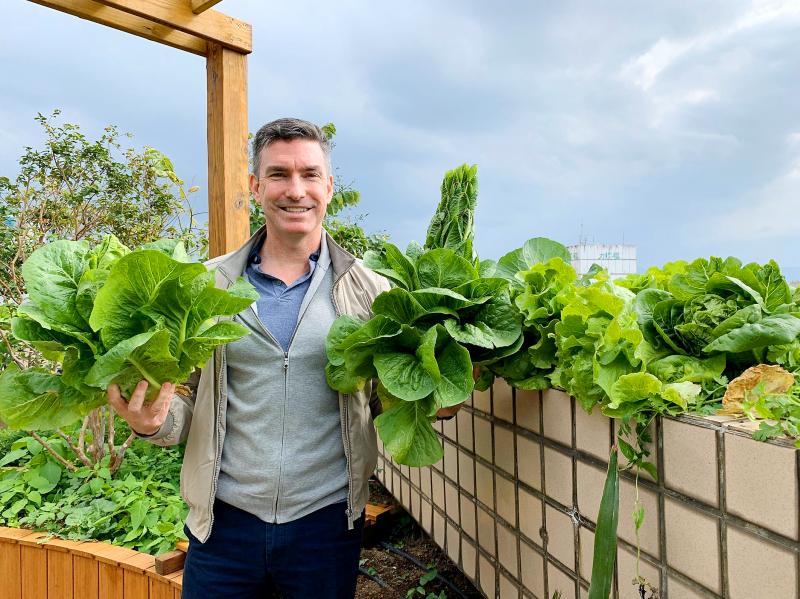
Photo courtesy of Winkler Partners
“We found that many elements of B Corp certification were things we’ve been doing for a while, such as tracking and reducing our carbon footprint, ensuring our employees are compensated fairly and generously, and providing paid leave above the legal minimum,” Dernbach says.
Winkler Partners decided to pursue B Corp status in September 2016. It received certification the following February.
To qualify, enterprises must score at least 80 points out of 200. The assessment process helps businesses identify areas in which they could improve, Dernbach explains. As a result, he says, the firm has expanded the accident and health insurance it buys for its employees, and lengthened paternity leave.
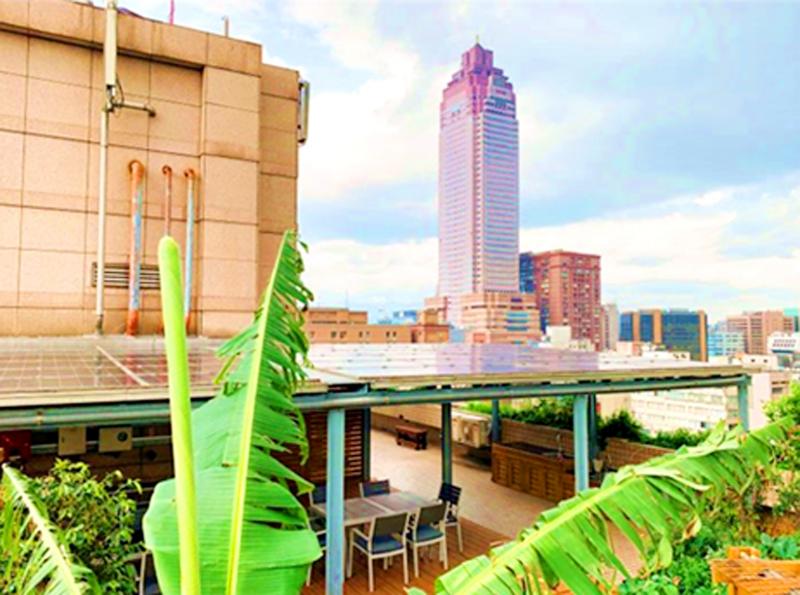
Photo courtesy of Winkler Partners
B Corps must also pay an annual certification fee that starts at US$500 for companies with a yearly turnover below US$150,000.
“Going through the certification process highlighted the value of formalizing some of our practices by including them into our work rules, to show they’re binding commitments on the firm’s part,” Dernbach says. None of these steps were particularly costly or difficult, he adds.
Asked if local regulations or laws complicate B Corps certification, Dernbach explains that law firms in Taiwan must be organized as partnerships, and only Taiwan-licensed lawyers and lawyers licensed in other countries but holding permits to practice here can be partners.
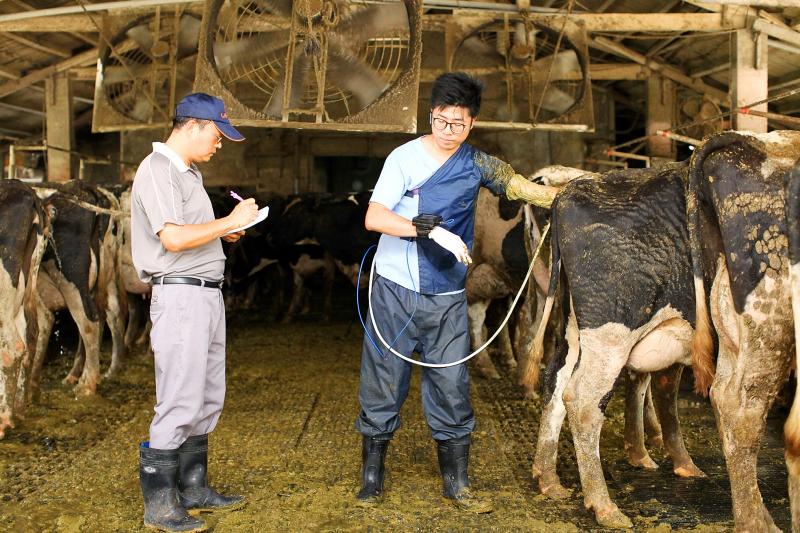
Photo courtesy of Family Mart
This is hard to reconcile, he says, with the emphasis the B Corp movement places on employee ownership through representation on the board or stock options. However, Taiwan is not the only jurisdiction in which law or accounting firms are restricted in this way, he adds.
On the plus side, he says, Taiwan’s mandatory universal healthcare, statutory paid leave, and certain other benefits mean that companies here score highly on those sections.
“In places like the US, healthcare provision and annual leave aren’t guaranteed by law for all employees,” he points out.
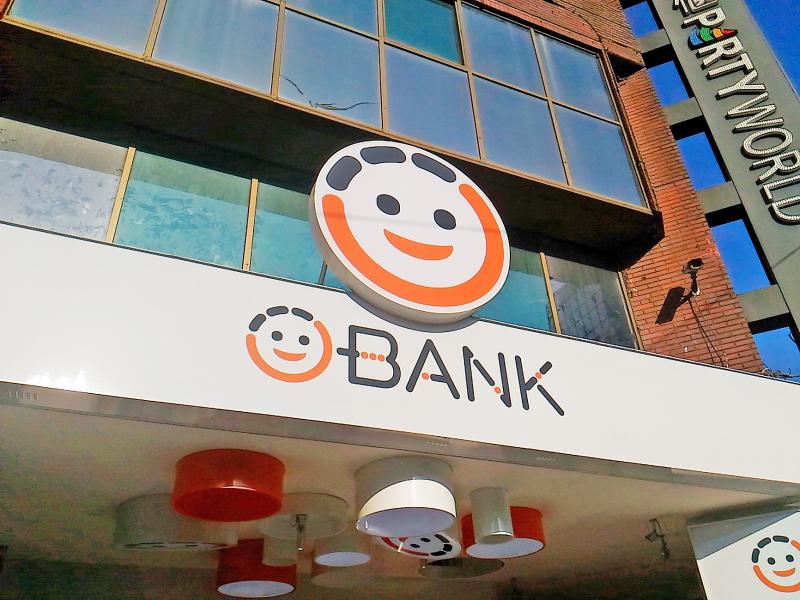
Photo: Lee Ching-hui, Taipei Times
To hold onto their B Corp status, enterprises must recertify every three years, and it’s expected that companies improve over time. When Winkler Partners recertified last year, Dernbach noticed that certain standards — for example those relating to paid parental leave — had been raised.
“There were additional questions about direct and indirect emissions, whereas when we first certified in 2017, they only asked about our overall carbon footprint. The disclosure questionnaire section has also recently been expanded to provide more insight into the clients and types of businesses we work with,” he says.
TOP IN ASIA
Taiwan currently has 33 certified B Corps, more than any other country in Asia. Dernbach concedes that none of them are household names on a par with B Corps elsewhere, such as ice cream brand Ben & Jerry’s or clothing brand Patagonia.
Yet he’s hopeful that, given a choice, “Taiwanese consumers, as they become aware of how B Corps are using business for good, will support them and choose products that are better for society and the environment.”
Dernbach has no doubt that Winkler Partners’ B Corp certification has been good for business.
“Several clients have made it known that B Corp status is relevant for them when choosing counsel. This shows that B Corp certification is a valuable metric for companies that seek partners who stand for something. B Corp status provides an additional level of credibility and transparency,” he says.
Ooh Cha Cha, which operates two vegan eateries in Taipei, has been a B Corp since last August.
According to founder Mai Bach, the pre-assessment questionnaire took her team about two months to complete. They then spent six to seven months on the key assessment phase, submitting answers and evidence, even though they didn’t need to make any significant changes to the way they operate.
“So many spreadsheets!” she recalls.
Bach says that, because awareness of B Corps isn’t yet widespread, Ooh Cha Cha’s customers don’t expect the certification, nor does the company expect it of their suppliers.
“We do look for certain things, depending on the industry or the ingredient. We’re concerned about quality, pesticide use, seasonality, and locality. We also really care about the environment for workers during production of our ingredients. There isn’t a one certification that fits every situation. However, the B Corp certification is one of the most holistic certifications available,” she says.
Taipei’s B Lab, Bach adds, “works tirelessly to help the public understand what this certification means, and to find interesting and unique opportunities for B Corps. We’ve had people find out about our company through the B Corp directory and reach out to collaborate. Social entrepreneurs face unique pressures and problems: Having a community to turn to for support is priceless.”
Steven Crook, the author or co-author of four books about Taiwan, has been following environmental issues since he arrived in the country in 1991. He drives a hybrid and carries his own chopsticks. The views expressed here are his own.

This is the year that the demographic crisis will begin to impact people’s lives. This will create pressures on treatment and hiring of foreigners. Regardless of whatever technological breakthroughs happen, the real value will come from digesting and productively applying existing technologies in new and creative ways. INTRODUCING BASIC SERVICES BREAKDOWNS At some point soon, we will begin to witness a breakdown in basic services. Initially, it will be limited and sporadic, but the frequency and newsworthiness of the incidents will only continue to accelerate dramatically in the coming years. Here in central Taiwan, many basic services are severely understaffed, and

It is a soulful folk song, filled with feeling and history: A love-stricken young man tells God about his hopes and dreams of happiness. Generations of Uighurs, the Turkic ethnic minority in China’s Xinjiang region, have played it at parties and weddings. But today, if they download it, play it or share it online, they risk ending up in prison. Besh pede, a popular Uighur folk ballad, is among dozens of Uighur-language songs that have been deemed “problematic” by Xinjiang authorities, according to a recording of a meeting held by police and other local officials in the historic city of Kashgar in

Jan. 5 to Jan. 11 Of the more than 3,000km of sugar railway that once criss-crossed central and southern Taiwan, just 16.1km remain in operation today. By the time Dafydd Fell began photographing the network in earnest in 1994, it was already well past its heyday. The system had been significantly cut back, leaving behind abandoned stations, rusting rolling stock and crumbling facilities. This reduction continued during the five years of his documentation, adding urgency to his task. As passenger services had already ceased by then, Fell had to wait for the sugarcane harvest season each year, which typically ran from

The People’s Republic of China (PRC) was out in force in the Taiwan Strait this week, threatening Taiwan with live-fire exercises, aircraft incursions and tedious claims to ownership. The reaction to the PRC’s blockade and decapitation strike exercises offer numerous lessons, if only we are willing to be taught. Reading the commentary on PRC behavior is like reading Bible interpretation across a range of Christian denominations: the text is recast to mean what the interpreter wants it to mean. Many PRC believers contended that the drills, obviously scheduled in advance, were aimed at the recent arms offer to Taiwan by the